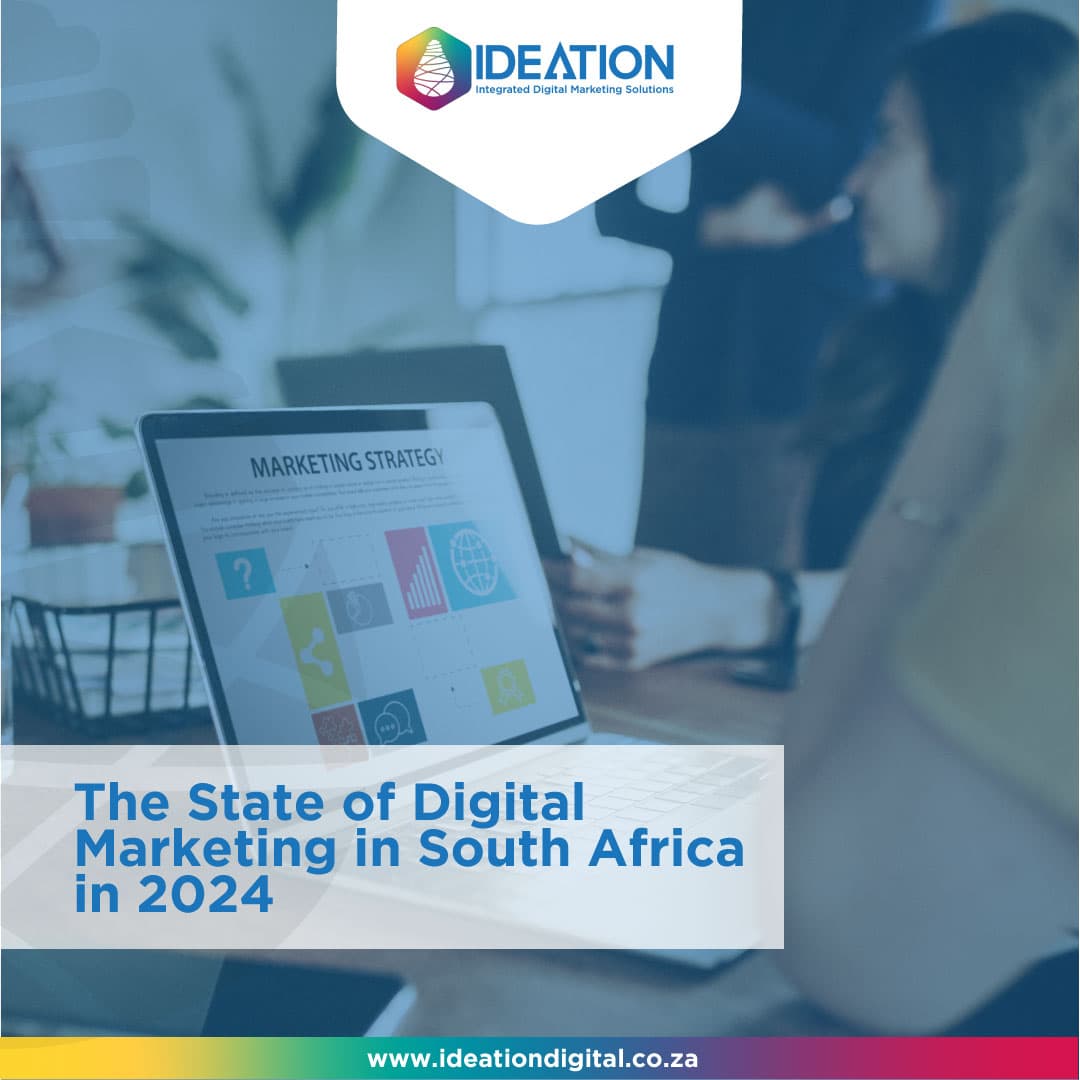The State of Digital Marketing in South Africa in 2024
26th Feb, 2024

In 2024, South Africa's digital landscape is more vibrant and transformative than ever before, presenting a plethora of opportunities and challenges for businesses of all sizes.
The evolution of digital marketing in the region reflects a global shift towards more interactive, targeted, and user-centric advertising strategies.
This article delves into the current state of the online advertising market, user demographics, the growth of social media and internet usage, and the critical role of digital marketing professionals in navigating this dynamic environment.
The Online Advertising Market in South Africa
South Africa's online advertising market has seen substantial growth, driven by increasing internet penetration, mobile device usage, and digital transformation across industries.
In 2024, businesses are leveraging a mix of search engine marketing, social media advertising, content marketing, and programmatic advertising to reach their target audiences more effectively.
The emphasis on data-driven strategies has enabled more personalised and engaging marketing campaigns, maximising ROI and customer engagement.
Current State of Online Users
The profile of online users in South Africa has become increasingly diverse, spanning various age groups, geographic locations, and socio-economic statuses. As of 2024, there's a notable increase in digital literacy across the population, enabling more consumers to engage with online content, e-commerce platforms, and digital services. This democratisation of internet access has broadened the reach of online advertising, allowing brands to target previously untapped market segments.
According to Data Reportal, South Africa’s internet penetration now sits at a whopping 72.3% of the total population. Positive initiatives like SA Connect by the Department of Communications and Digital Technologies, are driving forces behind this growth and aim to continue developing infrastructure well beyond 2025, indicating that SA internet users will only continue to grow.
The Current State of Social Media Users
Social media continues to dominate the digital landscape in South Africa, with platforms like Facebook, Instagram, Twitter, and TikTok seeing significant user growth.
The current state of social media users is characterised by high engagement rates, with consumers not only consuming content but also actively participating in brand conversations, sharing experiences, and influencing peer purchasing decisions.
This shift towards user-generated content and influencer marketing has prompted advertisers to adopt more authentic and interactive social media strategies.
Facebook remains SA's leading social media platform with 34.14 Million active monthly users. TikTok comes in at second place with 11.83 million users, LinkedIn at 11.6 million users, Instagram at 7.15 million users, Snapchat at 5.85 million users and X (previously known as Twitter) has dropped to 4.49 million users, with Threads (owned by Facebook) threatening their existence.

Although WhatsApp isn't a social media platform, it is important to note that it is SA’s favourite messaging platform. According to Statista, WhatsApp users in SA have been greatly increasing since 2013, and are forecasted to reach 21.92 million users by 2029.
The Imperative of Online Marketing in Your Marketing Mix
Integrating online marketing into your marketing mix is no longer optional; it's essential. The digital realm offers unparalleled opportunities for targeting, engagement, and analytics, allowing businesses to reach their ideal customers where they spend a considerable amount of their time.
The ability to measure campaign performance in real-time and adjust strategies accordingly ensures that businesses can achieve the most efficient use of their marketing budgets.
Digital marketing has become a pivotal aspect of modern business strategies, distinguishing itself from traditional marketing mediums through various key features and benefits. The comparison between digital and traditional marketing involves understanding the differences in reach, engagement, measurability, cost, targeting, and content adaptability. Here's how digital marketing compares to other marketing mediums:
How does Digital Marketing compare to Traditional Marketing?
Reach
- Digital Marketing: Offers global reach, allowing businesses to engage with audiences worldwide with just a few clicks. The internet's expansive reach breaks down geographical barriers, enabling even small businesses to access international markets.
- Traditional Marketing: Typically has a local or regional reach, limited by the distribution of physical marketing materials or the coverage area of broadcast media.
Engagement
- Digital Marketing: Encourages interactive engagement, providing immediate ways for consumers to interact with brands through social media comments, shares, likes, and direct messaging. This two-way interaction fosters a closer relationship between businesses and their customers.
- Traditional Marketing: Offers limited engagement, mainly one-way communication from brand to consumer through channels like print ads, TV commercials, and billboards, without an immediate way for the audience to respond or interact.
Measurability
- Digital Marketing: Highly measurable, with tools and platforms providing detailed analytics on campaign performance, including reach, engagement, conversions, and ROI. This data-driven approach allows for ongoing optimisation.
- Traditional Marketing: More challenging to measure precisely. While methods exist to estimate reach and impact (e.g., surveys and Nielsen ratings), they lack the immediacy and granularity of digital analytics.
Cost
- Digital Marketing: Generally more cost-effective, especially for small to medium-sized businesses. Digital channels often offer lower entry costs and more flexible budget options, such as pay-per-click (PPC) advertising.
- Traditional Marketing: This can be expensive, with significant costs associated with producing and distributing materials or securing media placements. The cost barrier can be higher for small businesses.
Targeting
- Digital Marketing: Offers sophisticated targeting options, including demographic, geographic, psychographic, and behavioural segmentation. Advertisers can tailor their messages to very specific audiences, increasing the relevance and effectiveness of their campaigns.
- Traditional Marketing: Has broader targeting capabilities, often based on the general demographic profile of a medium's audience, which can lead to less precise targeting and wasted resources on non-interested parties.
Content Adaptability
- Digital Marketing: Highly adaptable, with the ability to quickly update or change content in response to performance data or market trends. This agility supports real-time marketing and relevance.
- Traditional Marketing: Less flexible, given the static nature of mediums like print ads or billboards. Once produced and distributed, making changes is often not feasible or can be very costly.
Digital marketing offers distinct advantages in terms of reach, engagement, measurability, cost-effectiveness, targeting, and adaptability. However, traditional marketing still holds value for certain objectives and audiences, particularly when it comes to building brand awareness in specific locales or demographics less engaged online.
The most effective marketing strategies often integrate both digital and traditional mediums, leveraging the strengths of each to achieve comprehensive market coverage and impact.
The Importance of Digital Marketing Specialists
Navigating the complexities of the digital marketing landscape requires expertise and experience. Digital marketing specialists and professionals bring a deep understanding of the nuances of online advertising, including SEO, content marketing, social media, and data analytics.
These experts can help businesses craft and implement effective digital strategies, ensuring that they not only reach but resonate with their target audiences. The value of such expertise cannot be overstated, as it significantly impacts the effectiveness of digital marketing efforts and the achievement of business objectives.
In Conclusion
In 2024, the state of digital and online advertising in South Africa is marked by rapid growth, evolving user behaviours, and the increasing importance of targeted, engaging marketing strategies.
For businesses aiming to thrive in this digital age, embracing online marketing and enlisting the expertise of digital marketing professionals are crucial steps. As the digital landscape continues to evolve, staying informed and adaptable will be key to leveraging the full potential of online advertising in South Africa.
For assistance with an integrated digital marketing strategy, contact us today and a Digital Strategist will gladly assist you with building an efficient and well-planned digital route-to-market.
